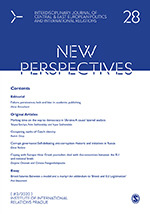
New Perspectives
New Perspectives aims to provide interdisciplinary insight into politics and international relations, with a focus on Central and Eastern Europe (CEE). The journal is affiliated with the Institute of International Relations Prague and provides a space for innovative perspectives coming from scholars working in the CEE region, and from global scholars engaged with the region and the wider issues that impact it.
New Perspectives encourages empirical, theoretical, conceptual and methodological innovations in scholarship on politics and IR, and aims to widen and deepen explanatory or interpretive frameworks. The journal sees pluralism with respect to approaches and viewpoints as the necessary condition for academic critique. New Perspectives is committed to the effective communication of high-quality original research to wider public audiences, and thereby seeks to foster the creation of useful knowledge, broadly understood.
Each volume centres on blind peer-reviewed research articles. The journal also welcomes review essays, interviews, auto-ethnographic commentaries, collaborative texts, and other non-traditional or creative formats of scholarship. New Perspectives is a member of the Committee on Publication Ethics (COPE).
Submit your manuscript today at https://mc.manuscriptcentral.com/nps.
New Perspectives seeks to attract submissions which address political aspects of regional affairs and their connections to the wider world, from the fields of: International Relations, Political Science, Security Studies and International Political Sociology; International Political Economy; Geography; Sociology; Anthropology; History; Cultural Studies and Legal Studies.
New Perspectives operates a rigorous peer-review process, facilitated by our world-class editorial board, and offers comparatively short turn-around times on submissions.
| Nicholas Michelsen | King's College London, UK |
| Suvi Alt | University of Groningen, Netherlands |
| Pol Bargues | Barcelona Centre for International Affairs, Spain |
| Pablo De Orellana | Kings College London, UK |
| Ernst Dijxhoorn | Leiden University, Netherlands |
| Filipe dos Reis | University of Groningen, Netherlands |
| Ela Drazkiewicz | Institute for Sociology, Slovak Academy of Sciences, Slovakia |
| Minda Holm | Norwegian Institute of International Affairs, Norway |
| Anatoly Reshetnikov | Webster Vienna Private University, Austria |
| Elke Schwarz | Queen Mary University of London, UK |
| Pelin Ayan | Anglo American University, Czech Republic |
| Roland Bleiker | The University of Queensland, Australia |
| Dorothee Bohle | European University Institute, Italy |
| Antoine Bousquet | Birkbeck University of London, United Kingdom |
| Mats Braun | Metropolitan University in Prague, Czech Republic |
| Christian Bueger | University of Copenhagen, Denmark |
| Juraj Buzalka | Comenius University in Bratislava, Slovakia |
| Zeynep Gulsah Capan | University of Erfurt, Germany |
| Vasyl Cherepanyn | National University of Kyiv-Mohyla Academy, Ukraine |
| Ondrej Cisar | Charles University, Czech Republic |
| Benjamin de Carvalho | Norwegian Institute of International Affairs (NUPI), Norway |
| Mitchell Dean | Copenhagen Business School, Denmark |
| James Der Derian | University of Sydney, Australia |
| Matthias Ebenau | IG Metall Bildungszentrum WBS, Germany |
| William Eddleston | Anglo American University, Czech Republic |
| Gabor Egry | Institute of Political History, Hungary |
| Rachel Epstein | University of Denver, United States |
| Rick Fawn | University of St. Andrews, United Kingdom |
| Karolina Follis | Lancaster University, United Kingdom |
| Dariusz Gafijczuk | Newcastle University, United Kingdom |
| Mark Galeotti | IIR Prague, Czech Republic |
| Sarah Green | University of Helsinki, Finland |
| Bela Greskovits | Central European University, Hungary |
| Lene Hansen | University of Copenhagen, Denmark |
| Kathrin Hoerschelmann | Bonn University, Germany |
| David Hugill | Carleton University, Canada |
| Michal Koran | Global Arena Research Institute, Czech Republic |
| James Krapfl | McGill University, Canada |
| Fritz Kratochwil | Central European University, Hungary |
| Vendulka Kubalkova | University of Miami, United States |
| Xymena Kurowska | Central European University, Hungary |
| Merje Kuus | University of British Colombia, Canada |
| George Lawson | Australian National University, Australia |
| Nicolas Maslowski | Charles University, Czech Republic |
| Marek Mikus | Max Planck Institute for Social Anthropology, Munich, Germany |
| Simone Molin Friis | University of Copenhagen, Denmark |
| Martin Myant | European Trade Union Institute, Belgium |
| Andrew Neal | University of Edinburgh, United Kingdom |
| Iver B. Neumann | Fridtjof Nansen Institute, Norway |
| Zoran Oklopcic | Carleton University, Canada |
| Polly Pallister-Wilkins | University of Amsterdam, Netherlands |
| Jiri Priban | Cardiff University, United Kingdom |
| Prem Kumar Rajaram | Central European University, Hungary |
| Nikolas Rajkovic | Tilburg University, Netherlands |
| Paul Roe | Central European University, Hungary |
| Jan Ruzicka | Aberystwyth University, United Kingdom |
| Stuart Shields | University of Manchester, United Kingdom |
| Michal Simecka | IIR Prague, Czech Republic |
| Helene Sjursen | Arena Centre for European Studies, Norway |
| Ty Solomon | University of Glasgow, United Kingdom |
| Eva Spackova | VSB Technical University of Ostrava, Czech Republic |
| Johan van der Walt | University of Luxembourg, Luxembourg |
| Juha Vuori | Tampere University, Finland |
| Wouter Werner | VU University Amsterdam, Netherlands |
| Ruben Zaiotti | Dalhousie University, Canada |
| Tomasz Zarycki | University of Warsaw, Poland |